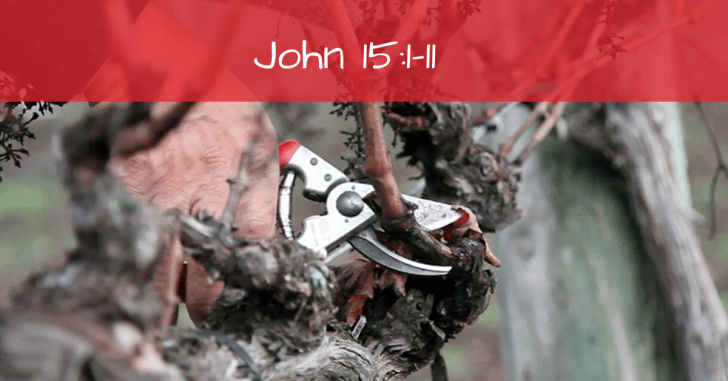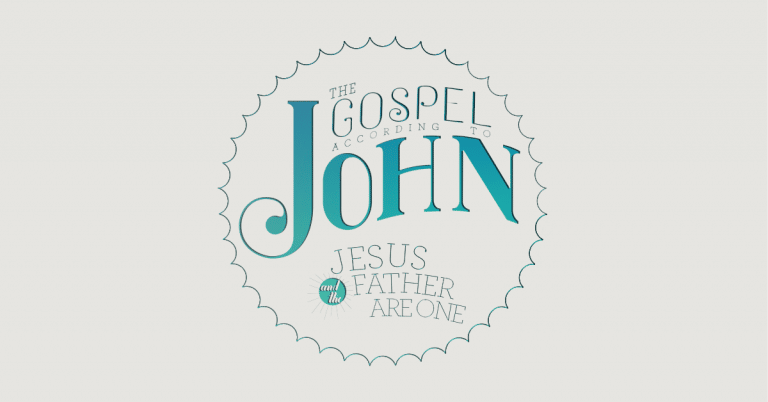John 15:1-11 | Vine, Vinedresser and Branches
[efstoggles class=”yourcustomclass”]
[efstoggle active=”” title=”Click here for today’s text”]
“I am the true vine, and my Father is the vinedresser. 2 Every branch in me that does not bear fruit he takes away, and every branch that does bear fruit he prunes, that it may bear more fruit. 3 Already you are clean because of the word that I have spoken to you. 4 Abide in me, and I in you. As the branch cannot bear fruit by itself, unless it abides in the vine, neither can you, unless you abide in me. 5 I am the vine; you are the branches. Whoever abides in me and I in him, he it is that bears much fruit, for apart from me you can do nothing. 6 If anyone does not abide in me he is thrown away like a branch and withers; and the branches are gathered, thrown into the fire, and burned. 7 If you abide in me, and my words abide in you, ask whatever you wish, and it will be done for you. 8 By this my Father is glorified, that you bear much fruit and so prove to be my disciples. 9 As the Father has loved me, so have I loved you. Abide in my love. 10 If you keep my commandments, you will abide in my love, just as I have kept my Father’s commandments and abide in his love. 11 These things I have spoken to you, that my joy may be in you, and that your joy may be full. (John 15:1-11)
[/efstoggle]
[/efstoggles]
METAPHOR
The vine, vinedresser and branches are a metaphor of who are we are in Christ, who Christ is in us and the work of the Father in our lives.
All metaphors break down at some level. This one does as well. However, the purpose of this metaphor is for us to understand the critical nature of our connection to Christ and to understand the work of the Father to cut away the lifeless and cultivate the the living. Like Jesus said in Luke 8:18 “Take care then how you hear, for to the one who has, more will be given, and from the one who has not, even what he thinks that he has will be taken away.”
THE WORK OF THE FATHER
1. The Father cuts off the fruitless branches
It is the work of the Father/Vinedresser to judge and determine who are the fruitless branches and remove them.
2a Every branch in me that does not bear fruit he takes away…”
6 If anyone does not abide in me he is thrown away like a branch and withers; and the branches are gathered, thrown into the fire, and burned.
Can someone who is connected to Jesus be cut away from Jesus? Yes! Jesus says, “Every branch in me that does not bear fruit he takes away.”
Calvinist or Arminianist
Whether you are a Calvinist or an Arminianist, both agree that what Jesus says is true – the unfruitful branches in Jesus are cut off from the vine. It’s apparent that one can be connected to Christ, the vine, and be cut off from the vine.
The Calvinist believes they (the unfruitful branches) are believers, but not true believers – disciples, but not true disciples. They have some level of connection to Jesus, but they aren’t real Christians. The end result = unfruitful life that is cut away from the Vine by the Vinedresser.
The Arminianist believes that these people could perhaps be true believers that no longer believes – disciples that are no longer true disciples of Jesus. The end result = unfruitful life that is cut away from the Vine by the Vinedresser.
Judas is a great example of the kind of person that Jesus is talking about. In fact, if we look at the greater context of this passage, Satan had just entered Judas and he had already conceived in his heart to betray Jesus. The other disciples were still thinking, at this point, that Judas was still one of the guys.
The work of the Father/Vinedresser is to cut off the unfruitful branches and throw them in the burn pile.
2. The Father prunes the fruitful branches.
2b …every branch that does bear fruit he prunes, that it may bear more fruit.
First of all, pruning is cutting. That’s a painful thought.
Pruning is discipline. Discipline can be a consequence for our actions, but it does not always mean punishment.
Discipline is often presented in the form of challenge and circumstance that effectively peels away the parts of us that are unproductive and unlike Jesus.
Hebrews 12:6, 10-11 – 6 For the Lord disciplines the one he loves, and chastises every son whom he receives.” 10 For they disciplined us for a short time as it seemed best to them, but he disciplines us for our good, that we may share his holiness. 11 For the moment all discipline seems painful rather than pleasant, but later it yields the peaceful fruit of righteousness to those who have been trained by it.
This is what theologians call the process of sanctification – God shaping us so that that we may share his holiness. Look again at what is says in Hebrews 12:11 – “For the moment all discipline seems painful rather than pleasant, but later it yields the peaceful fruit of righteousness to those who have been trained by it.”
The purpose of pruning is to produce more fruit. That why Jesus said, 2b …every branch that does bear fruit he prunes, that it may bear more fruit.” Our experiences, whether by persecution or hardship in circumstances, come not by random chance, but by the precision and expertise of the Vinedresser – for the purpose of producing more fruit.
So, we have this internal working, done by the Holy Spirit in us, as we abide in the branch – God the Son. We also have this, often painful, external experience of pruning by the hand of the Vinedresser – God the Father.
Optional: Consider the word of the apostle Paul in 2 Corinthians 1:8-9, when he says, 8 For we do not want you to be unaware, brothers, of the affliction we experienced in Asia. For we were so utterly burdened beyond our strength that we despaired of life itself.9 Indeed, we felt that we had received the sentence of death. But that was to make us rely not on ourselves but on God who raises the dead.
Here in John 15, Jesus is preparing his disciples for both defection from within and persecution from without. He’s saying, no betrayer will escape and your hardship will draw you into a more reliant and joy-filled union with me.
That’s why Verse 11 says, “These things I have spoken to you, that my joy may be in you, and that your joy may be full.”
Jesus wants us to abide in him so that we will not only experience his joy, we will be filled with joy. Joy looks like happiness, but isn’t dependant on happenings. Joy is an experience of exceeding gladness in spite of circumstances. That’s why James says to consider it pure joy when you encounter trial of many kinds. Jesus is saying, I’m telling you this so you can experience exceeding gladness even when life is the most painful and confusing.
ABIDE
Abide. This is apparently an important concept as Jesus says it ten times in eleven verses.
What does it mean to abide? Abide means to remain or stay with. It implies the idea of cohesive togetherness. To abide is to be doubly connected. Verse 4 says, “ Abide in me, and I in you”.
Optional: Baptism is a picture of this connection. Romans 6 and Galatians 3:27 imply that we are baptized into Christ. We are grafted into Christ. We are in him, and by the Holy Spirit, he is also in us. Doubly connected.
So, as we have this cohesive, double union with Christ, being in Christ and Christ in us, his heart becomes our heart; his thought become our thoughts; his desires – our desires.
That’s why verse 7 says, “If you abide in me, and my words abide in you (both and), ask whatever you wish, and it will be done for you.”
As we abide in Christ, his desires become our desires . When we want what Jesus wants, what Jesus wants happens.
And like verse 8 says, “By this my Father is glorified, that you bear much fruit and so prove to be my disciples.” When you want what Jesus wants, you’ll be praying for fruit and God will answer that prayer and be glorified.
Here’s what this looks like:
Verse 9 – “As the Father has loved me, so have I loved you. Abide in my love.” Notice how the focus is shifted to love. Verse 10 – “If you keep my commandments, you will abide in my love, just as I have kept my Father’s commandments and abide in his love.”
Now, what are the commandment of Jesus? We think first of a set of moral obligations, but Jesus says things like: “belive in me”, “receive me”, “abide in me”. As we peek ahead into next week’s text, John 15:12 says, “This is my commandment, that you love one another as I have loved you.” So, as we abide in Christ, the more we will love one another as Christ has loved us.





